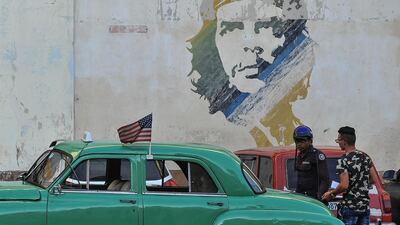With olive branches extended by Barack Obama and the Castro era drawing to an end, better times seemed around the corner for the beleaguered Caribbean island of Cuba.
After decades of Cold War tension with a mischief-making superpower, set against its defiant, anti-western neighbour, warmer US-Cuban relations promised benefits for the troubled Cuban economy, freer movement and a new age of mutual respect.
How distant that all now seems. For Mr Obama's successor as US president, Donald Trump, Cuba was a rogue country to pick a fight with and he soon he began to reverse the policy of rapprochement.
And while the late Fidel Castro's brother Raul is stepping down as president in April, the first vice president tipped to take over has his own air of belligerence. Previously seen by some as a moderate, Miguel Diaz-Canel was caught on video lambasting Cubans for copying Americans in celebrating Halloween, threatening to ban an independent magazine and sounding very Castro-like in his outlook. "It was the US that invaded Cuba, [that mounted] the blockade," he said. "They have to resolve these things to have normalised relations. We don't have to give anything in exchange."
None of that was in Mr Obama’s script. He might also be dismayed to hear that as far away as the UK, some money-changers refuse to sell US dollars to customers unwise enough to disclose where they are travelling.
Before a recent visit, I was told at a London branch of the retailer Marks and Spencer I would be denied currency in line with “US policy”. A protest on social media brought a fatuous response: “Fabulous you're off to Cuba for a holiday. We're bound by M&S Bank procedures and have been informed we're unable to sell US dollars to anyone visiting or living in Cuba due to sanctions.”
Yet Britain imposes no sanctions on Cuba. Marks and Spencer is a British company. The would-be buyer was British. Good, bad or indifferent, Cuba is a sovereign state. At least there was a positive sequel; I learnt that local surcharges on conversion made US dollars much less sensible a choice than euros, sterling or Canadian dollars in any case. M&S Bank made much of this in a follow-up statement to The National, though a desire to help the consumer had not been mentioned either at the store or in the Twitter exchange.
The Trump restrictions aim to make it more difficult for US companies and citizens to deal with Cuba. Theoretically, this targets military or intelligence-run businesses but the ban is wide-reaching, affecting even the hotel I stayed in, downtown Havana’s Ambos Mundo, once favoured by the US author Ernest Hemingway.
_______________
Read more:
US expels Cuban diplomats following sonic attacks
Tillerson says official Cuban travel is still risky
_______________
So far, the impact seems slight. Americans, once again limited to organised group travel for cultural or family purposes and under tighter conditions, can nevertheless plan visits, cheekily helped by advice from US websites.
Cubans appear happier than when I first started visiting 20 years ago. They are proud of their island’s resistance while seeing the obvious failings of rigid adoption of Soviet ways; butter was among commodities in short supply in Havana this month. But while tourism is strong, there is little sign yet of economic improvements reaching ordinary households. Westerners can still spend as much on dinner for two as a professional couple earn in a month.
If Mr Trump’s will prevails and a hardliner takes over from Raul Castro (who may well retain some influence), the immediate prospects are unpromising.
Many feared Cuba would lose much of its charm as more Americans and US companies arrived. “They’ll buy up all our vintage cars and leave behind Starbucks and McDonald’s,” ran a common lament.
Cubans are entitled to prefer a better living standard as opposed to “staying quaint”. But it probably takes both sides to see sense and there may be a long wait.


